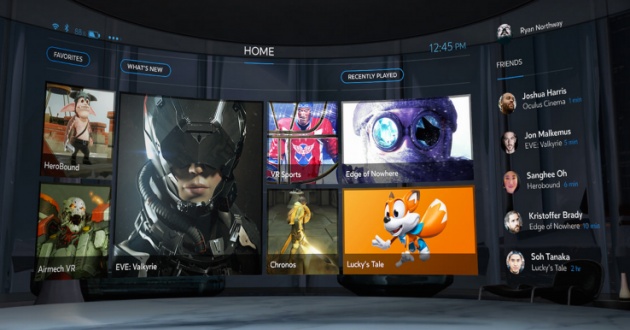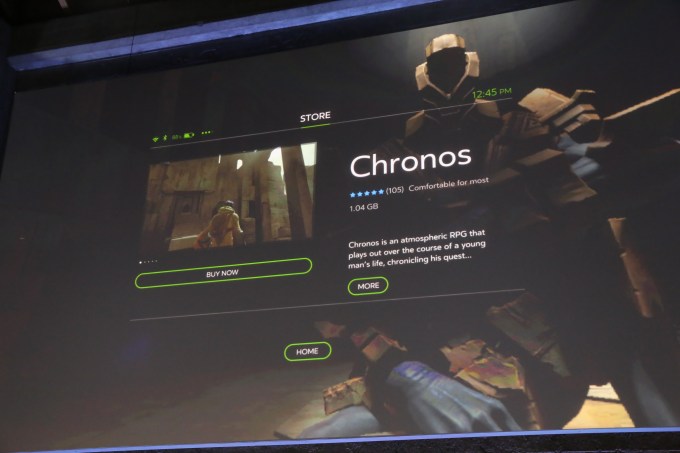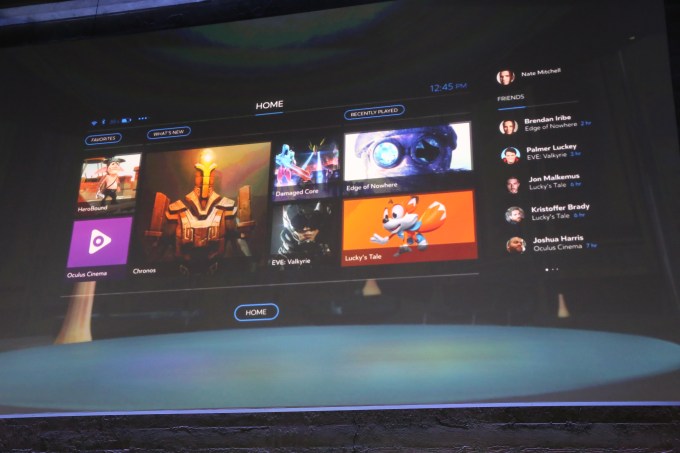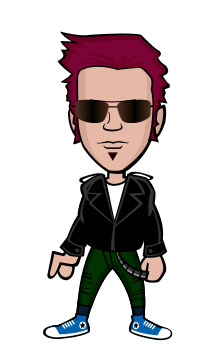
Oculus doesn’t want to make you puke or scare you to death. So when its revamped app store launches for its consumer Rift headset shipping Q1 2016, it will review games and experiences for safety, CEO Brendan Iribe tells me.
Yesterday Oculus held a press event where it unveiled the consumer Rift headset that will come with an Xbox controller and optical sensor, showed off some upcoming flagship games, and previewed its Oculus Touch handheld motion controllers.
Here’s a gallery of all the gadgets Oculus revealed:
After the presentation, I caught up with Oculus’ CEO to ask how his company will work with third-party hardware and software developers.
Motion Tracking For All

The new Oculus Rift sensor camera can track the movement of a constellation of LEDs on the Rift headset, and soon, third-party hardware
Oculus is making its own hardware but will be compatible with a wide range of outside peripherals. An Oculus SDK will let third-party devices pass data to the headset, but they’ll also be able to piggyback on Rift’s sensor.
The way Rift tracks your head movement is by covering the headset with a constellation of little LED markers that the sensor camera can recognize. The company put them on its new Oculus Touch motion controllers too. But Iribe tells me outside developers will be able to coat their devices in the markers, which will let the Oculus sensor track them as well.

The white dots inside the Rift are LEDs tracked by the Oculus sensor to translate physical movement into VR
Iribe says Oculus is still in the planning stages talking to developers, but tells me “it’s going to be really easy for other people to make third-party controllers that work with that same tracking system. We’ll be providing full APIs for the entire tracking system, the headset system, and the audio system.”
You can check out the new Rift headset, tracking sensor, and Oculus Touch controller up close in this video:
Pre-Approvals, Just Like Apple’s App Store
As for software, Oculus announced it’s working with huge game studios like EVE’s CCP Games, Gunfire Games, and Insomniac Games, and will invest $10 million into indie game developers. But what’s the process to get games and other experiences to users?

Oculus worked with CCP Games to prepare EVE Valkyrie to be one of the Rift’s flagship games
Iribe confirmed that Oculus will pre-approve all apps that are available through its app store. He tells me “We are going to monitor the content and make sure that it fits the policy we put up which is this safe and clean environment that everyone can know, and love, and trust just like other popular app stores…You’re going to need to be approved first.”
That makes it more like Apple’s App Store, though Google Play recently moved to an approval model too. This way, Oculus can make it doesn’t distribute anything that could sour people on VR as a whole.
“This Won’t Make You Sick”
As part of the approval process, experiences will be given a “comfort” rating, that denotes whether they’re more or less likely to make someone dizzy or scare them. Iribe stressed that Oculus is an open platform, and people will be able to make experiences accessible outside its official Oculus Home App Store. Those could potentially be more hair-raising than Oculus would distribute.

Oculus’ demo of Home showed that atmospheric role playing game Chronos got a “Comfortable for most” comfort rating
For experiences in Oculus’ official channel, though, Iribe says “We’re going to put comfort ratings on them so you really know what you’re getting.” This could make the Rift safer for people with a high-propensity for nausea, like Iribe says he is. They could know to stick to calmer experiences like watching a concert or exploring a relaxed landscape rather than piloting a spaceship.
Taking the scariness into account could avoid someone having a heart attack because a virtual monster popped out from behind him. The store will include user reviews of experiences too. Oculus will essentially be its own Entertainment Software Review Board, the organization that gives video games age ratings
Iribe explains “Something can be comfortable from a disorientation standpoint, where it doesn’t make me feel bad…it doesn’t have crazy locomotion like a roller coaster. But if it is really, really super intense, we do want to give people warnings about that.”

Warnings will tell people that relaxed experiences like this are comfortable for everyone
VR Tax
Oculus’ CEO also says company’s app store plans to adopt a monetization strategy similar to other popular platforms. While Oculus hasn’t made a formal announcement, Iribe says “you can imagine that it’s a very standard business model.” Today’s standard is the 30% tax that Apple and Google apply to apps and in-app purchases sold on their platforms.
Preemptively justifying this tax, Iribe said “There’s a lot of fees and a lot of engineering that goes into building and managing and maintaining that store. It doesn’t just happen on its own. You actually have to support it. There’s all kinds of credit card transaction fees…so we’re going to run one in a similar way to how they’re run by other companies that work well.”

The Oculus Home app store
Iribe wouldn’t specify the exact cut Oculus would take, but told me all will be revealed before the Rift ships in Q1. While developers might not be excited to give up a share of their revenue, it aligns incentives between them and Oculus so both want to sell as many VR experiences as they can. As the most well-known VR platform, Oculus is likely to be where developers will find the biggest audience. Even if other VR platforms from HTC or Sony try to undercut whatever Oculus charges, developers will go where they can sell at scale.
Safe To Strap In
Oculus’ visibility means it has a responsibility to steward the VR ecosystem. If it allows terrifying, nauseating experiences on its platform without a proper heads-up , it could burn people and make them hesitant about VR forever.
“Having bullets fly at you in VR is actually really, really intense and the more real it gets, the more it’s going to feel like real life, and you don’t really want to be shot at in real life” Iribe concludes. “We’ve gotten really used to it on the 2D monitor because our brain is saying ‘don’t worry, don’t worry, it’s safe.’ As soon as you put on VR and your brain’s not saying that anymore, it’s not necessarily the comfortable experience that it is on a monitor, and we’ll have warnings around that.”













